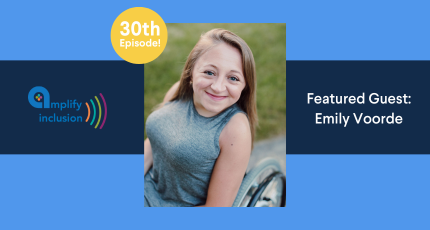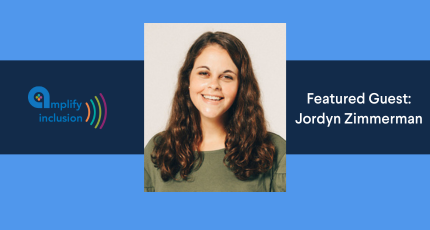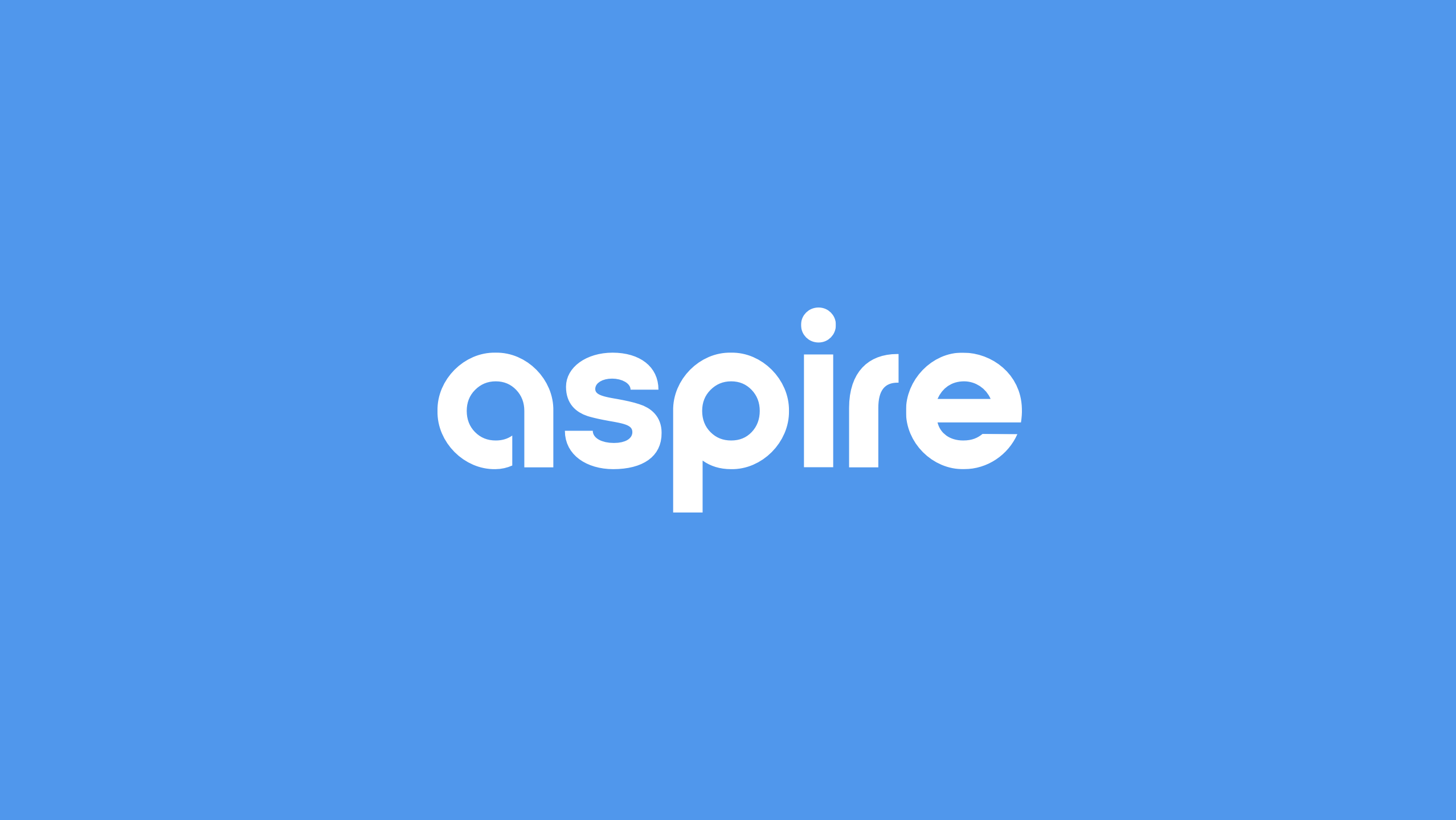S3. Ep. 3
Heather
Date
August 17, 2021
Time
19 minutes
Category
Amplify Inclusion Podcast
Share

Welcome to Amplify Inclusion, a podcast where we share authentic stories of inclusion in action.
Heather, self-advocate and public speaker, shares about her personal journey and her passion for creating positive change. Listen now or view the full transcript below.
This episode was co-produced and engineered by Subframe Sound with music courtesy of Nealle DiPaolo. This season is made possible thanks to generous contributions from First Bank of Highland Park and members of the Aspire community.
Full Transcript
Clare [00:00:03]
Welcome to Amplify Inclusion. I’m Clare from Aspire. Thanks for joining us for real stories and conversations about the power and importance of disability inclusion. Today’s episode features Heather, self-advocate and public speaker. Heather is committed to educating others about disability and empowering people with disabilities to be strong self-advocates. I recently spoke with Heather to learn more about her personal journey and her passion for creating positive change in her community. Here’s our conversation. Heather, thanks so much for joining me today. Heather [00:00:39]
Oh, you’re welcome.
Clare [00:00:40]
I know that you’ve done public speaking and you talked a lot about self-advocacy. So what draws you to those types of things?
Heather [00:00:49]
In the past, I’ve been treated wrong. So, I know how it feels to be treated unfairly or less of a human being because of your disability. So, I took my experiences and I decided one day I’m not gonna let that happen to other people, if I can help it. So, that’s why I do what I do. There’s so many misconceptions out there about people with disabilities and that’s what I try to do on a daily basis is fight that and I educate people. That’s my passion. I use my voice to stand up for what’s right, and if I see somebody being treated wrong or something, I stand up for it because somebody got to have a voice for those that don’t have a voice.
Clare [00:01:49]
Can you tell me a little bit more about your disability and your experience of it?
Heather [00:01:54]
My disability is a muscle control disorder. It makes it difficult for me to do certain movements and I’ve had it since I was born. When I was born, I weighed 2 pounds 4 ounces, and I had to
stay in the hospital for three months after I was born. According to the doctors, I’m not supposed to be here right now. I wasn’t supposed to live past the first 24 hours. In my early days, my mom was taking me to like speech therapy, occupational therapy, every kind of therapy to make me the best that I can be. And growing up, my brothers and my sisters had to help my mom a lot with the physical care. So my mom would have to lift me in and out of the tub, lift me in and out of the chair. And my brothers and sisters would have to help with some of that because my mother couldn’t lift me by herself as I got older. So, my family has made a lot of different sacrifices because of the situation and I really do appreciate my family because without my mom doing what she did, taking me to the physical therapy and occupational therapy and speech therapy, I wouldn’t be able to do the things I can do now. So most of the credit for the person I am goes to my mom because she instilled a lot of things in me. She told me, “never let your disability be an excuse for not being able to do something.” She said, “even if you don’t do it the normal way, you can figure out a way to do whatever it is you want to do.” And even now, I have my bad days where I get upset about being in a chair because my disability is purely physical, so I don’t have any mental issues. So it’s frustrating for me, sometimes, because I feel trapped in a chair, but I understand everything that’s going on around me and I want to have a “normal life.” And when I have those days, my mom tells me, “it’s okay to be upset for those days, but you have to pick yourself up, dust yourself off, and move on, because there’s a purpose for you to be here.”
Clare [00:05:09]
Sounds like, she was really empowering for you. Do you think your mom has been any sort of a, an inspiration for you to be the public speaker and advocate that you are? Heather [00:05:21]
Oh, yeah. Before I was in sixth grade, I was in a segregated school system for people with disabilities. But mentally, it wasn’t challenging enough. So I fought to get into my public school. During that fight with the public school system, we had board meetings with the public and parents were yelling at her telling her that she didn’t know what she was doing and she was basically being unfit. And um, my mom was like “this is what my daughter deserves and this is what she wants and I’m going to support her 100%.” So I got my, I guess you would call it, ‘fight instinct’ for my mom.
Clare [00:06:19]
That sounds like. It must have been a really challenging and stressful time. Heather [00:06:23]
Yes. It was, it was. It took, I think three years for them to allow me to enter school system. Clare [00:06:34]
What was that like for you and your family to kind of have to put up that battle for so long? Heather [00:06:40]
It was tough. There was actually a point where I thought, maybe I should give up because there was a lot of resistance from parents of the public school system and people from the school system where I was.
Clare [00:07:01]
Why didn’t you give up? What kept you going?
Heather [00:07:03]
Because I knew I had a right to be educated like everyone else. And sometimes people tell you “No” about things. But if you think it’s right, you gotta keep fighting for it.
Clare [00:07:17]
Yeah. Definitely. It sounds like it paid off. You were able to make some change. Heather [00:07:21]
Yeah, I entered the school in sixth grade and I graduated high school in the top 10% of my class. But it took me a while to get there because I was the first one in my school district with a disability.
Clare [00:07:38]
So you kind of paved the way for a lot of other students.
Heather [00:07:42]
Yeah, I really did. And it’s interesting because a lot of parents now, when they hear my name, they know who I am. Because their children is in the school system, basically, because of me. Clare [00:08:02]
What does that feel like for you to know that there are students that won’t have to fight those same battles?
Heather [00:08:09]
It makes me think that all the struggles that I go through on a day-to-day basis is worth it if I can help one person. So that whole experience of fighting, it was hard going through it, but now it’s like, if I can help one person with my experiences and my story, then that’s what I do. Clare [00:08:35]
So, when you think back to the different times that you have pushed behind on an issue, or spoken out, or had a public speaking engagement- are there any that are particularly memorable to you that you really treasure?
Heather [00:08:49]
Well, I led a session at Speak Up Speak Out, I want to say three years ago. And I told my story about how I fought to be included in the regular school system and there are about fifty people, I
would say fifty people in the room. And when I was speaking people’s eyes just got wide. I think they were amazed at my- the fact that I didn’t give up and the fact that I actually pursued something that I felt I needed to do. So, I think that the people were amazed that I didn’t let these people who have authority over me, tell me what to do. That just stood out to me, because I got a lot of good questions after, you know, I was done. And it was powerful because I didn’t know that I could touch so many people in my story.
Clare [00:09:54]
I want to talk a little bit about misperceptions. We know that’s a huge challenge and a huge barrier is the way people without disabilities think and have false perceptions of what disability means. So, I would like to ask you if there are a couple common myths that you would like to address?
Heather [00:10:15]
There’s a big one that comes to mind for my situation because I’m in a chair and people often look at me and think “Oh, she has a physical disability, so she automatically must have a mental one.” And that’s not the case. I am fully mentally aware of everything that’s going on around me. I can make decisions for myself. Like, if I’m out at a restaurant or something with a group of people, the waiter or waitress will talk to the people I’m with and ask them what I want to eat instead of asking me. And when they do that, I say, “Excuse me, but I can hear and understand what you’re asking. So ask me. I’m the one purchasing the food,” and then they will. But it amazes me like how people automatically just make these assumptions based on my appearance. It makes the person with the disability feel offended when you’re talking around them and not talking to them. And number two- we should be treated just like any other patron that comes in the place. There should not be any difference. But I think it starts because people aren’t educated. There needs to be more education with just the restaurants, the store owners there needs to be more education within the businesses in the community, too, because if we don’t educate them people, when we access those businesses they don’t know how to react. Even the police. Police and fire- they need to know how to interact when they respond to a call. Clare [00:12:35]
Yeah, definitely. I’m glad you brought that up. It’s really important to keep in mind how vast the misperceptions are and that it really influences the barriers across the board. Heather [00:12:46]
Yeah, because it makes it harder for us when we go somewhere, like- that may be the first time they interact with someone with a disability. So it makes it harder when they have no experience with us cause they’re like, “oh, what do we do?”
Clare [00:13:06]
So what about work experience- do you have certain goals or aspirations for jobs you’d like to have?
Heather [00:13:12]
I started a degree in psychology when I graduated high school and I would like to go back and complete it and become a doctor in psychology and counsel kids who have physical limitations. And educating kids about how to interact with people with disabilities. And I believe that the younger you start with kids, the better because they need to be educated as soon as possible so that when they see someone or interact with someone, it’s not strange to them. Clare [00:13:58]
So I wanted to ask you before we finish, if there’s anything I didn’t ask that you would like to share about across your life?
Heather [00:14:05]
Well, I got married in 2005. I would say that’s the biggest accomplishment of my life. I knew him since I was 9 years old. I met him at the segregated school system and I was actually looking for him for a while. And we were engaged for four and a half years. Our wedding was actually in a church. We had like, I believe a hundred eighty people in the church. It was beautiful. And now I have the pictures and the memories to remember it. We were married for five and a half years when he passed away.
Clare [00:14:55]
Oh I’m sorry. Heather.
Heather [00:14:56]
He’s been gone ten years now. I miss him every day. There’s not a day that goes by that I don’t think about him. He was a big supporter of mine. He had my back through everything. So every decision I make now, I think, “what would he say?” before I do it.
Clare [00:15:22]
Yeah, and I’m so glad that you guys found each other again. That’s so interesting that you were, you were looking for him.
Heather [00:15:28]
Yeah.
Clare [00:15:30]
Thanks for sharing that with me, Heather.
Heather [00:15:31]
You’re welcome.
Clare [00:15:33]
Last question here. So, if you could just describe in your own words, what a truly inclusive world looks like to you. I know- what are what are some aspects of that? And you could just maybe describe some characteristics of an inclusive world.
Heather [00:15:50]
Well, to me, it would be that people with disabilities are common place. Like, other people wouldn’t judge you. They would just see you as a normal part of society like everyone else and there’s so many like things that aren’t where they need to be. Like the healthcare system and people’s perceptions of people in general. A totally inclusive environment would be where you’re accepted, no matter what your issues are, and you have all the tools you need. People’s perceptions and negativity towards a person with a disability would be gone. Some nights or some days I just lay in bed and get mad because people are just so ignorant when it comes to the topic of disability. And like, I know in my lifetime, I’m not gonna make it all better. But that’s what I strive to do because of people after me- I don’t want them to struggle as much as I did. So, that’s why I do what I do. Even though some days, it gets tiring to be an advocate for everyone all the time. It gets tiring to have people tell you “no” all the time. But I do what I do because someone needs to. If everybody just sits here and be quiet about the situation, then nothing is going to be done.
Clare [00:17:41]
That was really powerful, Heather. I appreciate that. I love- I love hearing you speak and I can only imagine that kids and adults that have gotten a chance to listen to you really had powerful takeaways. I really appreciate all those thoughts and really admire the commitment that you put into this and I so enjoyed chatting with you today.
Heather [00:18:03]
I enjoyed it, too. It’s stuff that needs to be said. My message is important and it touches me that I touch people like that.
Clare [00:18:18] I’d like to thank my guest, Heather, for sharing her story and insights with us. Join us next time for my conversation with author and activist, Emily Ladau, to hear all about her brand new book, Demystifying Disability. Until then, be a part of the inclusive movement by rating and subscribing to Amplify Inclusion and stay connected with us at aspirechicago.com. This episode was co produced and engineered by Subframe Sound. This season is made possible thanks to generous contributions from First Bank of Highland Park and members of the Aspire community.
Be Included
Get news and events information.


